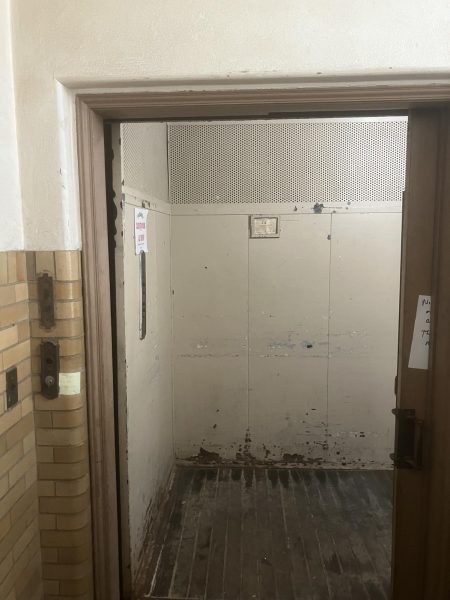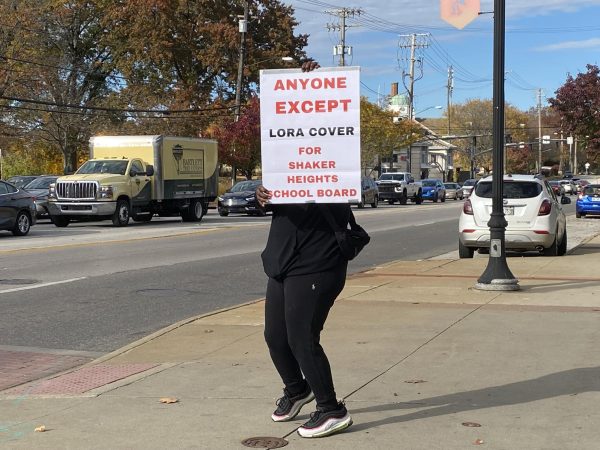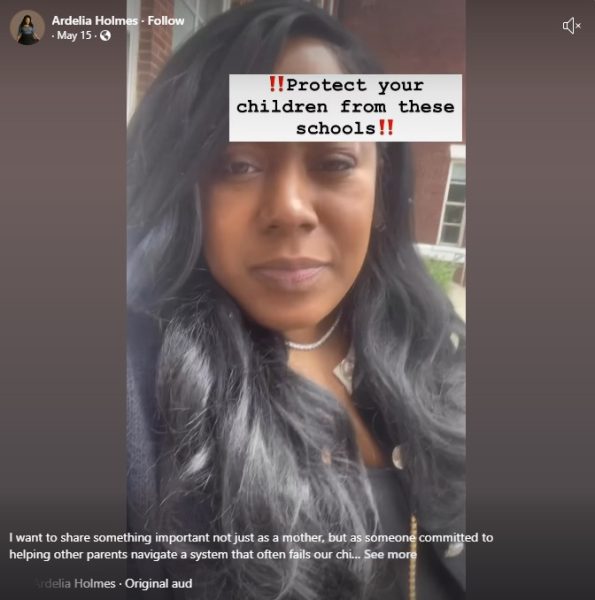Principal Candidates Share Plans, Concerns as Search Comes to Close
Finalists respond to community questions at evening appearances.
My two children go to school every single day and they’re learning every single day,” said Superintendent Gregory C. Hutchings. “We need to use [the state report card] as one of many things to make decisions nationwide, but its only one measure.”
The search for the high school’s new principal is nearing an end.
There are two candidates in the running: current Interim Principal James Reed III and Springfield High School Campus Director Jonathan G. Kuehnle.
Reed became interim principal in July 2015. He is a lifelong Shaker resident and graduate of SHHS.
Before coming to Shaker, Reed was principal of the Renaissance School of Humanities and International Studies in Cleveland Heights High School. He retired from that position at the end of the 2014-15 school year after 27 years in the Cleveland Heights-University Heights school district.
Reed taught social studies at Wiley Middle School for 11 years before moving to Cleveland Heights High School in 1999, where he served as a unit principal.
In 2003, Reed helped design the Cleveland Heights High School’s small-school program, which reorganized students into smaller groups, each with a different academic focus. Reed was founding principal of the Renaissance School, serving students interested in the study of world affairs, languages and cultures.
Reed holds a bachelor’s degree in sociology and political science from Eastern Michigan University and a master’s degree in education and administration from Cleveland State University.
Kuehnle (pronounced keenly), is campus director at Springfield High School in the Springfield City School District, located 191 miles southwest of Shaker Heights. Springfield serves approximately 8,000 students. He has served in that capacity for nearly three years and in that role, oversees five academies.
Previously, Kuehnle worked two years as district grants administrator for the Pickaway County
Educational Service Center in Circleville (Ohio) City Schools, where he coordinated all district grants, including the federal Race to the Top program and the Ohio Teacher Incentive Fund.
He served as principal of Circleville High School for three years, achieving the school’s first “excellent” rating on school report cards and raising the school’s graduation rate from 78 percent to 91 percent.
Before that, he was assistant high school principal and athletic director for three years for the Wellston (Ohio) City Schools.
Kuehnle taught for six years in the Northwest Local School District near Cincinnati. He began his teaching career with the Baltimore County Public Schools in Maryland.
Kuehnle holds bachelor’s degrees in education, history and diplomacy from Miami University and a master’s degree in educational administration from the University of Cincinnati. He earned a superintendent’s license from Ohio State University.
The candidates each spent a full day, Reed on March 4 and Kuehnle on March 7, meeting with community members, parents, students and staff to hear opinions and concerns for the climate of the high school and the expectations of the next principal.
In the evening of each day, the candidates answered questions from an audience of community members in a public meeting. Attendance of each event was roughly the same, with around 40 audience members.
Director of Communications Scott Stephens moderated the event.
The first questions asked of Reed was, “What do you see yourself doing in five years? In seven years? What are your commitment goals for Shaker?”
“In one to five years, I would like to be the principal of Shaker Heights High School,” Reed said. “If I’m the person who is chosen for this job i will stay as long as the people in the high school think that I can help them.”
Asked about his experience with International Baccalaureate and Advanced Placement, Reed said, “IB gives students the opportunity to view the world from a different lens. The AP lens, I think, is like an à la carte meal and the IB program is like a seven-course meal.”
An audience member submitted a question that stated, “What changes do you want to make to the high school in terms of practices, policies, organization, curriculum, and what ideas do you have to improve Shaker Heights High School”
“What I’ve always been struck by … is that Shaker students have a voice that is very important to them, that they always want to have a say in policies and life in this high school,” Reed said. “What I have tried to do and what I will continue to try to do is offer students a voice so that we can figure out what exactly it is students would like this high school to become for them. It really is their high school, the adults are here simply to guide.”
Reed noted the need for an organization in which students could use their voice. “There needs to be a student organization, that is a regular organization, that ought to see how we commemorate folks, particular anniversaries, particular months of celebration that are important to students. I think that there needs to be a greater ability for students to access their opinion,” Reed said. “I would envision that a group of students from each of the organizations in the high school would meet on a regular basis about how we might change and look at policies in the high school.”
Reed responded to a question regarding fights in the high school and offered an alternative disciplinary measure.
“In a public school there are folks from every kind of situation, and there are folks that have told their children that [physical confrontation] is how you settle arguments,” Reed said. “When they come to school here, we can’t have them settle arguments in some of the ways they have been taught to.”
“I would like to institute next year an opportunity to assign our students as a consequence special help, conference period — and that’s your consequence. You need to go three times a week,” Reed said.
In response to a question regarding communication with parents, Reed said, “I constantly ask myself ways I can connect with parents.”
“We need to do better … welcoming new parents to the district,” Reed said. “I think that we need to figure out ways we can have them access the school in a more effective way.”
In regard to further communication questions about the threat situation that occurred Oct. 7, Reed said, “It pointed out inconsistencies and holes in the systems that we had. More than anything, we were able to get out of that situation safely, we were able to handle the situation and debrief as a community and a school … about what our mistakes were that day and developed an emergency plan that I hope treats every emergency situation we face. I can’t tell you that with social media that situation won’t happen again. I can tell you that some of the things we did on that day and I did on that day, I will not do again,” he said.
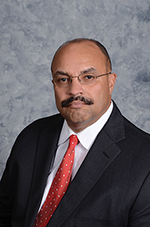
Interim Principal James Reed III
A submitted question raised concerns about Reed’s approach to the Feb 26 Hoods Up Act. “I’m an African American. I was a history teacher, I understand that the importance of February really is different to everyone. But, I also have a different responsibility, and I told students this,” he said.
“My responsibility is to keep this entire building safe. I’m not a principal for black students, I’m not a principal to white students, I’m not a principal for Asian or Hispanic students, I’m a principal to all students in Shaker, and their safety is my paramount concern,” Reed said.
Numerous questions submitted questioned why Reed decided to apply for this position after planning on retiring last year, before becoming interim principal.
“I would not do this for anyone other than Shaker Heights High School,” Reed said. “They convinced me that for a year this may be something that I find rewarding. Three days into my time here, I realized that it was better than rewarding, that this was a situation in which I would like to keep going.”
Stephens gave Reed the opportunity to make a closing statement. He replied, “Go, Raiders.”
Monday, asked about his future career aspirations, Kuehnle said, “At some point I do aspire to be a superintendent. In five years, I see myself in Shaker. In seven years, I see myself in Shaker. In 10 years, I see myself in Shaker. My wife and my three daughters and I see ourselves living in Shaker.”
Kuehnle said his experience, passion and familiarity with a high school environment is among his strong assets. “I’m very familiar with many aspects of the high school principal job. I’ve been in Springfield for about 17 years and I’ve gotten two different assignments, working with a very large, diverse and amazing group of students and teachers in each location,” Kuehnle said.
Kuehnle said that he enjoys being active within the community. “ I enjoy getting to know our students. I enjoy spending time out of my office, in the hallways and in the classrooms, attending different events, and just being part of the community,” said Kuehnle. “ And to me that’s probably the strongest skill set. It’s being relatable and in addition to be knowledgeable, but also to be approachable.”
Kuehnle explained his familiarity with the IB Diploma program, which is offered at Springfield High School.
“It’s even more impressive that Springfield High is a school with over 90 percent poverty, but our kids can participate fully in the IB Program, and I will promote kids to do this from Shaker or from anywhere else,” Kuehnle said. “It’s an amazing program, because it’s not just about the academic component, but it’s also about the philosophical component, so that while you may master the content of certain classes, more importantly you learn what it is to be a global citizen, and that to me is a skill that serves you far beyond high school and into life,” Kuehnle said.
Kuehnle noted that during his tenure at Circleville, the graduation rate increased by 14 percentage points into the mid-upper 80s.
“You heard me say that Springfield High has over 90 percent of our students coming out of poverty, and when I reviewed the research at Shaker, I’d say a bit over 30 percent at the high school were in a poverty situation,” Kuehnle said. “The key on our end is to identify what we can do as far as qualifying background services or other targeted supports, to help reduce the non-academic barriers to success for our students in these circumstances … our job is again to work with kids and their families to identify and remove those barriers so that these kids can be as successful as all of our kids,” Kuehnle said.
Kuehnle made a promise to students in response to a question regarding his role as an instructional leader. “I will come in to all your classes, and if you happen to be taking a test or another assessment at that time, I’m the instructional leader of the school; go ahead and give me a test,” Kuehnle said.
In response to a question about communication, Kuehnle said, “You cannot over-communicate.”
Kuehnle suggested Sunday evening robo-calls home with weekly information for families, which he instituted at Springfield.
Kuehnle, who is a parent of a child with special needs, answered a question about special education. “I am a passionate believer in really leveling the playing field and making accessible the opportunities for all students,” Kuehnle said. “We think they are disabled and we have a difficult time seeing what their abilities are.”
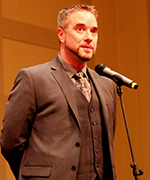
Springfield High School Campus Director Jonathon G. Kuehnle
In response to a question about whether the high school should employ universal rules or allow teachers to establish their own, Kuehnle explained the need for consistency.
He explained the “three C’s of leadership” which are collaboration, communication and consistency, “You first have to collaborate on a development or continuation of the rule. Once those decisions have been made, the communication portion comes into effect, and you have to let all the students and the staff and the parents know, and then it becomes very important among the staff to enforce with consistency.”
Kuehnle said he uses “real-time data” to track student achievement. “Every two weeks teachers get together and have data teams and analyze the data from their classrooms and ask themselves three questions, ‘What results are we getting? Why are we getting them? What are we doing about it?’ This enables us to perform an education triage rather than an educational autopsy.”
Kuehnle also explained an organizational change he made at Springfield that established 10 teacher-based teams with one administrator, centered on content area and allowed time to meet and collaborate.
In regard to standardized testing, Kuehnle suggested that the community decide which test is most appropriate in assessing students while still obliging to mandates, “We will do our best professionally to satisfy any mandates that are put on us, that is our professional obligation but, at the end of the day we’re the ones who know our kids the best,” Kuehnle said.
In response to a question about the arts, Kuehnle said, “Arts should not stop at the stage door, arts need to enter the classroom and be infused with instruction.”
A question asked how Kuehnle believes his staff would describe him. “Very intelligent, deeply caring for the kids, involved, very knowledgeable of curriculum … fixated on data.”
In regard to a question about the lack of diversity in AP and IB classes, Kuehnle explained an initiative at Springfield in which students who typically would enroll in a lower-level English courses took an IB English course instead. “While they may not have been prepared to participate in the full Diploma Program, they were at least ready to start getting that experience,” he said.
A question about technology prompted Kuehnle to mention the $6 million initiative Springfield undertook last year to issue a one-to-one Apple laptop program for its students.
In his closing statement, Kuehnle said, “I’m very excited about the opportunity to serve as principal to Shaker…Shaker’s community cares deeply, meaningfully and truly about education, and that is something so inspirational to me.”
According to Stephens, the district will offer the position to its chosen candidate sometime before spring break.
Journalism II Reporters Julia Barragate, Ellie Vahey and Mekkah Husamadeen contributed to this report.

![My two children go to school every single day and they’re learning every single day," said Superintendent Gregory C. Hutchings. "We need to use [the state report card] as one of many things to make decisions nationwide, but its only one measure."](https://shakerite.com/wp-content/uploads/2016/03/high-school-web-1-900x600.jpg)
